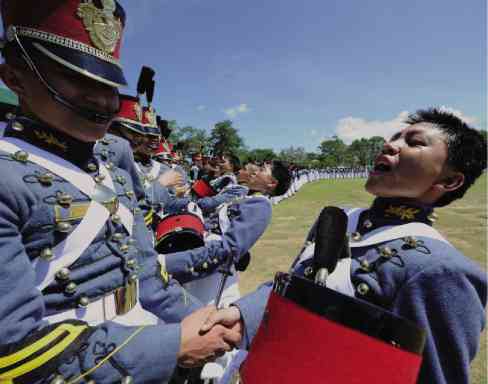PMA now more open to hearing cadet gripes

UPPERCLASSMEN of the Philippine Military Academy accept newly admitted members of the corps of cadets in an incorporation ceremony in this photo taken in 2015. EV ESPIRITU
DAYS before he graduated from the Philippine Military Academy (PMA) on March 13, newly commissioned Navy Ensign Kristian Daeve Abiqui said he and his fellow graduates of PMA Gabay Laya Class of 2016 left behind a corps of cadets that was very willing to listen.
Abiqui, the class valedictorian, was referring to a series of grievance mechanisms put up for cadets who questioned punishments imposed by a cadet honor committee.
Although his name was barely mentioned, dismissed cadet Jeff Aldrin Cudia’s denunciation of the honor code in 2014 prompted the premier military school to improve how they treat cadets who have issues, Brig. Gen. Rozzano Briguez, PMA commandant of cadets, said.
All cadets undergo trial by a committee composed of their peers to address violations of the honor code and the honor system.
The code and honor system require the cadets to follow traditional and time-honored sets of conduct. “The honor code is a gentleman’s agreement,” said Abiqui, who chaired the honor committee.
Cadets have sworn against lying and cheating and tolerating those who commit these infractions.
Cudia had challenged an honor committee recommendation to dismiss him, weeks before the graduation of PMA “Siklab Diwa” of 2014, for allegedly lying to justify his two-minute tardiness in class.
His case became public when his sister posted details of the honor committee decision over social media. Soon online commentaries discussed a common impression that Cudia’s punishment had not matched the offense.
Things have calmed down since then. Gauging by how many parents and walk-in students have acquired application forms for the PMA entrance examinations at a recruitment booth during PMA graduation week, people have faith in the integrity of cadet training, Staff Sgt. Robert Periodico said.
“I was surprised my booth was very popular. All 500 forms I had prepared for the day were all taken,” he said.
More transparent
But because of how the public had reacted, Briguez said the PMA had issued procedures that would make the honor committee “more transparent and open to addressing cadet complaints.”
Maj. Gen. Donato San Juan II, PMA superintendent, said the honor system had always been controlled by the cadets.
“We have an honor committee, [composed of members] elected by the cadets. They review all cases of honor violations and they have to vote unanimously [on every verdict],” San Juan said. “Before, during my time [in the academy], the honor system could not be reviewed by the superintendent. We expected the cadets to be honorable enough to decide what was right and what was wrong.
“But because of the changing times and the issues of two years ago… we are now allowing a review of the decisions of the honor committee. There is now [a way to] appeal. Before the decisions were final and could be executed,” he said.
Briguez said grievances could be coursed first through the PMA tactics group, as well as the office of the commandant of cadets. A higher PMA review board had also been formed to assist the superintendent.
Tracking system
The reforms appeared to have helped cadets adjust better to academy life, Briguez said, adding that a tracking system of honor code violations in the last two years had shown a 50-percent drop.
Part of the change involved how members of the honor committee would vote, Abiqui said.
Members of previous honor committees were not required to present a written justification for their votes. “But now … we explain our votes, so if there are questions … we could explain our decision,” Abiqui said.